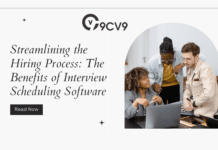Hiring an intern can be a great way for your company to work with a talented students or fresh graduates.
Finding an intern has gotten more difficult in recent years due to the negative attention that has surrounded internships and the companies that offer them.
This is a response due to worries about the increasing number of unpaid internships.
Which, as we all know, are an illegal and unethical technique to obtain free labour.
On the other hand, the internship will offer the fresh graduates who lack of experience an invaluable experience.
As they started to move from theoretical knowledge to a real work environment.
How to Build a Successful Internship Program
Develop a Clearly Defined Job Description
Schedule Regular Performance Reviews
How to Build a Successful Internship Program
Hiring an intern will assist your company if you have a well-structured company structure and guiding the intern with their work.
Even better results can be achieve by offering proper training prior to the start of the program or conducting an intern orientation.
The more money and resources your organization is ready to invest in the internship program, the better.
It is also better for your company to have a more competitive internship program.
Since the stronger the candidate pool, the more competitive the program.
You’ll attract great students if you offer a great program.
In the future, these students can be your potential permanent employee.
Develop a Clearly Defined Job Description

No one can work efficiently if they are have no direction regarding their work.
This is especially true for fresh graduates who are entering the internship with little to none experience and knowledge of the employer’s expectations for them as an intern.
Supervisors can begin the planning process to guarantee that their interns are successful by clearly defining their work assignments and expectation for their job description.
Seeing as their work will contribute significantly to your company projects.
An actual job description can be very helpful not only defining the internship but also when evaluating performance at the middle and end of the actual internship.
Schedule Regular Performance Reviews
Regular schedule performance reviews can helps you provide an honest assessment of your interns’ performance so you can track their progress.
A good performance review provides an opportunity to assist your interns in learning.
While also providing a true evaluation of whether or not they are reaching your expectations at the same time.
However, don’t make the mistake of using the performance review to point out all of your intern’s flaws.
You’ve probably heard of the sandwich technique to evaluating employees or delivering constructive feedback, and you should use it to evaluate your intern as well.
This is a pretty easy strategy in which you praise your intern for the work they has done so far.
Then, give them some constructive feedback to help them better themselves, and praise them again to let them know they are doing well and meeting expectations.
Keep Your Intern Busy

Developing short and long-term projects for your intern will keep them engaged and help them accomplish their best work.
Interns quite often complain about not having enough work to do or being given work that is unskilled or does not engage them in solid assignments that will benefit both them and the employer.
Just as employers frequently complain about interns using work time to make personal calls and emails. More or less just surfing the internet or checking their friend’s status on Facebook.
So as an employer, don’t make the common mistake of not giving your intern enough work that enable them to show their performance during internship.
How to Hiring an Intern
Here are some suggestions that can help you in hiring the best intern for your company.
Despite knowing what to do with those interns you should know how to find the best interns for your company.
1. Outline Your Needs

Before you even begin looking for an intern, make sure you understand why you need one.
An intern will not be the perfect person for unpleasant job that no one else wants to do.
The partnership between you and your interns should be symbiotic.
With both parties benefiting from the experience, interns can learn about the industry your business is on and you can assess them for a future recruits.
After you have a good understanding of what the intern would like to accomplish, start putting together a detail overview of what the internship will include.
Firms should make every expectation known during the recruitment process.
Including what time the intern is expected to arrive, when they are expected to leave, and exactly what they will be working on during the day.
The importance of structure cannot be overstated.
You’ll also want to figure out what the internship’s outcomes will be for the company.
Depending on your requirements, do you want a senior or a freshman?
Is the internship going to be repeated every semester?
Is this a one-and-done situation, or does your company plan to hire that person when the internship ends?
It’s preferable to be prepare than to find yourself making things up as you go along.
2. Look in the Right Places
After you’ve decided on an internship program, you’ll want to start hiring an intern.
If your company has an human resource department, you should go there first.
They usually have the greatest relationships with schools or universities and have been train to screen potential interns.
They can provide you with a list of prospects who meet your criteria.
Using your human resource department isn’t the only approach to find an intern.
Sometimes, the owners themselves will have to do the job of finding interns on their own.
It’s time to start the interview process after you have a filter out the potential candidates list.
It should be handle in the same manner as if you were recruiting a regular employee.
You’ll want to inquire about their work experience, assess their suitability for the intern position, learn why they want the job, and whether they have any prior expertise in the industry.
You want to see if they’ll get along with the rest of the team.
When recruiting an intern, there are a number of specific qualities to look out for.
Probably you want someone who is interested in the position, adaptable, open to learning, self-driven, outgoing, and professional in appearance.
3. Communicate a Plan

By this point, you’ve chosen your intern, hired them, or it’s their first day on the job already.
What are you going to do ?
First, you need to create goals that are Specific, Measurable, Attainable, Relevant, and Timely – SMARTY.
Set realistic expectations for the intern and explain those expectation to them.
Otherwise, if it’s too much to handle, you’ll never get what you need done.
It’s much easier for everyone to reach those goals if you concentrate your focus and focus on expectations.
That also entails entering those specific tasks into a tracking tool, such as Excel spreadsheet.
Break it down by week and meet on a regular basis to review the spreadsheet, goals, and progress toward reaching them.
The key to a positive experience is active participation and involvement.
Rotating your intern among different departments is an excellent method to accomplish this.
Allow them to obtain a sense for the industry by allowing them to try out different aspects of that as well.
Make sure you’ve outlined who they’ll report to, what their function will be, and what they should be learning when they switch to a new specialization.
If the intern will be working in a single department for the duration of their stay, match them with a mentor – but make sure it’s someone who wants to help.
4. Don’t Hide From Discipline
Interns should be treated the same as other employees, which means they should follow the same rules.
Not every internship experience will be perfect; you may find up with someone who slacks off, refuses to participate, or simply spends too much time on their phone.
Considering they haven’t actually worked anywhere, fresh graduates might be a little flaky at times.
So you may end up with people who don’t have soft business skills like punctuality, the willingness to work the entire time, or the ability to not be on their phone.
In such cases, communication meetings may be useful for following up on any of these issues.
You should keep notes from every meeting to illustrate how the intern is progressing toward their goals.
If there’s a problem, the first thing you should do is ask where they need guidance.
The most important thing is to stick to their performance improvement plan in weekly meetings.
Which are used to track progress toward resolving a workplace problem.
You’ll risk retaliation if you don’t go through that process and instead let the intern go. You want to meet with them regularly so that if an issue arises, it will be as obvious to them as it is to you.
It all comes down to communication and making sure you know exactly what you’re expecting. You may need to spend a little more time convincing them that this is what they must do in the actual world.
And if you are ready to hire some great interns, then check out 9cv9 Hiring Platform.
Check also our other recommendation for:
- How to Find and Hire Talents in Indonesia in 2021?
- The Top 10 Marketplace E-Commerce in Indonesia in 2021































![Writing A Good CV [6 Tips To Improve Your CV] 6 Tips To Improve Your CV](https://blog.9cv9.com/wp-content/uploads/2020/06/2020-06-02-2-100x70.png)


